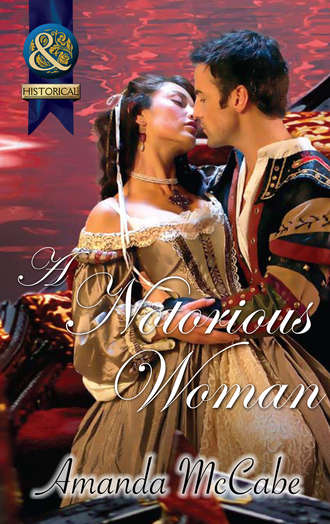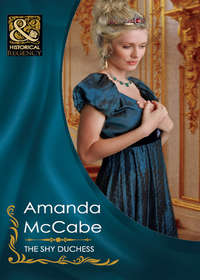
Полная версия
A Notorious Woman
She heard Bianca gasp, felt the maid clutch again at her sleeve. Those prosaic things brought her back to earth again, and her vision cleared. The count watched her closely, as if to compel her to agree. Such strange eyes he possessed…
“No, I thank you…” she began.
“Ah, Signora Bassano, you cannot refuse me.” The count laid one beringed hand over his heart. “We are a lonely vessel of men, as you see, and ask only to be graced by your lovely presence for a brief while. I can offer you a fine view of the ceremony.”
Before Julietta could answer—could refuse—a great cry went up around them, drowning out whatever Ermano said next. The Doge appeared in his great ceremonial barge called the Buccintoro, gliding into place at the head of the procession. Andrea Gritti, the Doge himself, was resplendent in a robe of cloth-of-gold and ermine, much like Count Ermano’s own colour scheme. As the Buccintoro moved out to the lagoon itself, the other vessels followed. Music grew louder around them, growing to a celebratory denouement; flowers rained down in a shower of colour and scent. And standing just behind the Doge was—No! It could not be.
She peered closer, clinging to the pole, and saw that it was, indeed, Marc Velazquez, clad in rich blue velvet, jewelled cap in hand as he stared out to sea. His thick, dark hair tangled in the breeze, making him look like a pirate even as he stood in the most exalted company. He seemed every inch the dashing hero.
And she had agreed to go to a ball with him tonight! Should she really do such a thing, when she worked so very hard to be as inconspicuous as possible?
You will be masked, her mind whispered insidiously. No one will know it is you. Just look at him. Can you really resist the chance to dance in his arms, just once?
That blighted internal voice! Always tempting her. Yet she did take another glance. He was laughing, his head thrown back in mirthful abandon, strong and dark, a part of the sea and the sun. And she found she could not resist.
Count Ermano and Balthazar also turned to watch the procession, and Julietta took that split-second chance to slip away. Soon—all too soon—she would have to face her unruly passion for Marc Velazquez. But not just yet.
The private sala of the Palazzo Grattiano was echoingly quiet after the jubilant crowds outside, the dim firelight flickering on the white marble floors dour after the flash and colour of the festival. Marc was glad of the quiet, though; he could finally think, finally drop the façade of Great Hero, if only for a moment. And he needed to think. Badly.
He was alone now, as Ermano Grattiano had been detained below with another of the Doge’s counsellors. Marc crossed the room to one of the tall windows looking down on the canal, his boots echoing on that cold, immaculate floor. Heavy, deep-green velvet curtains hung there, blocking out the dying light of day. He parted the fabric, drawing it back to let in a ray of orange-pink sun.
The sala was not very large, as the grand public rooms of the palazzo were. It was not meant for balls or suppers, but for private family meals, quiet conversation. But it was opulent, the walls covered in elaborate tapestries depicting scenes from the life of St Lucy, the furniture carved and gilded, upholstered in pale green brocade. The massive marble fireplace looked like nothing so much as a monumental tomb, supported by straining, Atlaslike figures, surmounted by carved saints and seraphim.
It had been a very long time since Marc had been in this room, longer than he cared to remember. Yet nothing had changed, not an ornament or a cushion, only a few different portraits on one of the walls. It was still the same cold hell.
Marc pushed the curtains back all the way, sending light rushing into the furthest, dimmest corners, and leaned against the marble sill, crossing his arms over his chest. Below him, the canal was thronged with boats full of pleasure-seekers, people masked and flush with laughter and wine and the promise of pleasures that would come with the night. Soon enough, he would be one of them. He would don his cloak and mask, seek out the lovely Julietta Bassano for an evening of music and dance and—well, whatever might come along.
Julietta Bassano. He had thought of her more than he would care to admit in these last days. Her image would appear in his mind when he least expected it, as he dined off gold plates in the company of great families, as he listened to music in grand salas—as he lay in his strange bed at night. He would picture her, tall, fair and dark as the night, serene as the Madonna surmounting this fireplace. Always so quiet, so elegant, always keeping her own counsel.
But the dreams of midnight—ah, they were very different. Only last night he had envisioned her there in his rented chamber, her black hair falling over her shoulders and down her slender back, her austere black-and-white gowns vanished, clad only in a chemise the colour and texture of moonbeams. She leaned over him amid the satin cushions, a tiny half smile on her rose-pink lips. Softly, slowly, her fingertips touched his throat, slid down over his shoulder and bare chest, leaving a ribbon of fire in its wake. She bent forward, her hair brushing silkily against his cheek, and she whispered strange foreign words into his ears.
He had known, even in the dream, that she told him rare and wondrous secrets, secrets that held the key to his deepest desires. Yet he could not concentrate on them, could not remember them. He only knew her touch, her magical touch, only longed to feel the honey of her lips on his, her breasts pressed to his naked chest…
“Maledizione!” Marc slapped his hand flat on the marble sill, relishing the sting of it against his callused palm. He reached up and unlocked the window, shoving it open to let in a gust of cool breeze. The high, jewelled collar of his doublet was choking him, so he unfastened it and ran his fingers through the loose, tangled fall of his hair.
The chilly air cooled his blood, yet still he remembered that dream, how very real it had been, how it had shaken him. When he awoke to find the courtesan who came to him for the night sleeping beside him, her pale red-gold hair spread across the black silk sheets, he snatched her into his arms and kissed her awake. Yet even her great charms, practised and perfect, could not erase the dreams of Julietta Bassano.
She was only meant to be a means to an end, a link in the careful chain he had forged over so many years. He could let nothing stand in his way.
And yet there was something in her dark eyes…
The door to the sala creaked open, drawing him out of his thoughts on the puzzle of Julietta Bassano. Marc turned, only to find that it was not Ermano Grattiano standing there. It was his son, Balthazar, poised as uncertainly on the threshold of that room as he was on that of life itself. He was tall, ungainly in his leanness, full of a fire, a yearning that he could not yet understand or control, angry and restless.
Marc knew this because he had been much as Balthazar was at eighteen, bursting with the heat and passion of life. Yet Marc had only been the adopted son of a Spanish sea merchant, with only his own wit and ambition to bring to the world. Balthazar Grattiano would inherit all of his father’s vast holdings. Money, lands, fleets, jewels.
Women. Perhaps one in particular, a black-haired widow full of secrets? Marc studied Balthazar carefully for a moment. No, this slim youth could have no appreciation for the subtleties and mysteries of a woman like Signora Bassano. One day, perhaps, if he did not follow his father’s path, his consuming desire to possess and destroy.
Marc had no quarrel with young Balthazar. He even felt rather sorry for him, despite his rich inheritance to come. But Marc would not allow him to stand in the way of what he had come so far and given so much to accomplish. No one would stand in the way of that.
“Signor Balthazar,” he greeted, when the young man still hesitated in the doorway. “Good day to you.”
Balthazar’s jaw tightened, and he tilted back his chin to stare at Marc, a strange light in his pale green eyes. “I see my father has kept you waiting, Signor Velazquez.”
Marc shrugged. “It is no hardship to wait in such a grand chamber, with such a glorious view.”
Balthazar came into the room to join Marc at the open window, the last rays of the day’s sun sparkling off the tiny diamonds sewn on his white velvet doublet. He wore a belt of more diamonds and deep purple amethysts, and another diamond hung from his ear, large as a thumbnail, set in an elaborate filigree of gold. Despite these great riches, he radiated only unfocused anger. Passion with nowhere to go.
Marc wondered briefly if he should introduce the young man to the pale courtesan of last night. She was beautiful and very skilled, but unfortunately he could not quite recall her name. And it seemed Balthazar had no trouble attracting female attention of his own. Below them, a silvery blond beauty who had been lounging in a gondola, her scarlet stockinged legs carefully displayed, sat up and gave him a dazzling smile and a wave. Balthazar in turn gave her a small nod. So, the thwarted passion was not of a sexual nature.
It had to be something deeper.
“They say you are much favoured by the Doge,” Balthazar said, still watching the woman in the red stockings. His tone was careless; only the stiff set of his shoulders betrayed even an inkling of his real feelings, whatever those could be.
“I have been very fortunate since I came to Venice,” Marc answered. “Many people have shown me kindness.”
“Why should they not? You are Il leone. My father has also shown you great favour.”
Marc studied the young man carefully, pushing down a flash of impatience with Venetian dissembling. “Your father and I have business together.”
“Mutually beneficial business, of course.”
“Does anyone conduct any other sort?”
“Indeed.” Balthazar turned away from the blond beauty to face Marc. His eyes were like sea glass now, almost iridescent. “Yet not everyone appreciates the favour you have been shown. They think you are merely a condotierre, hired sea power.”
“I have certainly faced my fair share of jealousy before, Signor Balthazar. It follows any man of any consequence, great or small. But I appreciate the warning.”
There was the sound of footsteps on the marble stairs outside the room, the faint echo of masculine laughter. Balthazar’s gaze flickered to the doorway. “My father does not easily tolerate challenges to his position. Even from business partners.”
“I have no desire to be a counsellor to the Doge. I will be gone from Venice soon enough.”
Balthazar nodded. “Still, one can never be too careful in this life, Signor Velazquez.”
He left Marc’s side and crossed the room with his loping, youthful gait, passing his father in the doorway without a word.
“Ah, Signor Velazquez,” Ermano said heartily. “I am glad to see that my son has been keeping you entertained while I concluded my business. I have sent for wine and refreshments.”
“Your son seems a promising young man,” Marc commented. He turned back to close the window, for the marble room had begun to grow chilly with the passing of the day. Below, torchlight shone on Balthazar’s white doublet and diamonds as he climbed into the blond courtesan’s gondola. She looped her arms about his neck, leaning into him as they glided away.
“Promising?” Ermano stared down at the canal with narrowed eyes. “You are very kind to say so and, of course, I have great hopes for him. He is my only son. Yet I fear he has too much of his mother in him. She was from an excellent lineage, but of little spirit.”
With a beringed hand, he gestured towards one of the newer portraits on the wall, a depiction of a pale, plump lady overwhelmed by satin, sable, and jewels. The fourth Countess Grattiano. Marc pretended to study the painting, yet, really, he watched the count. Marc was much the same height as Ermano, taller than the average, but the count was wider, sturdier, his once well-muscled form turning slowly to fat. His white hair and beard were still thick, his gaze shrewd. He was an ageing lion, but powerful, alert, not yet ready to yield his glory to an unsatisfactory cub.
“I was married four times, you know?” Ermano said pensively. “All ladies of wealth and family, they served my fortune well, yet only one could give me a child that lived. A child of such surliness, such weakness. I fear for all I have built once I am gone.”
“Many youths pass through such dissatisfied phases. Signor Balthazar is young. He may well yet grow out of it.”
“I pray so.” Ermano turned his gaze on Marc, his eyes as green in colour as Balthazar’s, but more focused, less diffused with anger. “I would wager you never passed through such a ‘phase,’ Signor Velazquez. Your parents are fortunate, indeed, to possess such a son.”
Marc nearly laughed aloud at the delicious irony. “I will pass on your kind words to my mother, Count Ermano. Perhaps they will help her to forget the days of my youthful rebellion, when I refused her plan for me to enter the Church.”
“Your father is not living?”
Marc had a quick memory of Juan Velazquez, tall, swarthy, quick to temper, quicker to laugh. He had taught Marc all there was to know about ships and sailing, had imbued his adopted son with his own great love of the sea.
“Alas, no. Only my mother, who now resides in a convent near Seville.”
“She is blessed, to have produced a son who can be called Il leone.” Servants came into the sala, interrupting their conversation to set out platters of sweetmeats. A tall, dark, silent Turk poured spiced wine, bowing out of the room as Marc and Ermano seated themselves on the brocade chairs beside the massive fireplace.
“I have not yet given up hope, though,” Ermano went on. “It is true I am not a young man, but neither am I so very ancient. I could yet father more sons to inherit, perhaps even daughters who could marry well and bring further glory to the Grattiano name.”
The count intended to wed again, to produce yet more offspring to rain anger down on northern Italy? Marc nearly choked on his wine at the prospect. “I wish you good fortune in such an endeavour, Count,” he managed to say.
Ermano nodded thoughtfully. “Their mother would have to be strong, of course. No more weak-blooded signorinas. And intelligent, with a certain fire to her. I understand you have now visited Signora Bassano’s shop. Twice.”
Ah—so that was it. Ermano thought the tall, mysterious Julietta was just the woman to mother this great new brood. Marc could almost feel sorry for her. He placed his goblet of wine on the nearest inlaid table and faced the count. “I have. She seems a very—interesting lady.”
Ermano chuckled. “Sì, she is that. And very difficult to get near. She is so very prickly, like the artichoke. Yet I am sure that once one gets to her core it is quite—sweet.”
Marc felt a muscle tick along his jaw, tightening at the merest thought of Ermano putting his plump, jewelled hands on Julietta’s “sweet core.”
“Does she seem to like you?” Ermano continued, oblivious to Marc’s anger. “Will she talk honestly to you?”
Marc took a deep breath, bringing in the scents of the sugary cakes and Ermano’s mossy perfume. “It is difficult to say. She is, as you say, rather prickly. And very cautious.”
Ermano waved his hand in a careless gesture. “Ah, well, she will come around. You are Il leone, hero of the republic! You must continue to visit her, gain her trust. Then we shall proceed to the next stage of our plan.” He lowered his goblet to stare solemnly at Marc over its rim. “You will not be sorry you have agreed to help me, Signor Velazquez. I have much influence in Venice. I can be a great friend—or a terrible enemy.”
Marc returned the steady regard, not flinching, not turning away. As am I, Ermano, he thought coldly. As am I.
Chapter Seven
“Well, Bianca, what do you think? Shall I disgrace my escort?” Julietta turned slowly before her mirror, gazing back over her shoulder to make sure the fall of her skirt was straight and elegant.
Bianca clasped her hands before her and nodded, black eyes shining. “Oh, madonna! It is beautiful. Where have you been hiding it?”
“In that clothing chest, of course.” Where it had been packed away from her trousseau over all these years, unworn, unneeded. Julietta was not even sure why she had kept it. Most of her other grand clothes had been left behind in Milan. Elaborately embroidered silks and velvets were impractical in the shop, too obtrusive and ornate. Perhaps she had kept this one out of some strange sentiment. Or perhaps she had known that one day she would need it again.
Julietta turned back to face herself fully in the mirror. Her chemise was of ivory-coloured silk, thin, soft, shot through with glistening golden threads that echoed the bodice and skirt of gold lace over gold satin. Sleeves of cloth-of-gold were tied on with thin white ribbons twisted with tiny gold beads. It was a few years out of fashion; the sleeves were narrower and the skirt a bit fuller than was strictly desirable, the waist too high. But the lace was still sumptuous.
As Bianca took up a needle and thread and began to stitch up a tiny tear at the hem, Julietta fussed with her hair. Usually hair was not her foremost concern. She always brushed and braided it in the morning, pinning it up and covering it with a sheer veil so it was out of the way of her work. No trouble at all, and she did not miss the elaborate coiffures of her early married days, all twisted and oiled plaits and curls. Tonight, for some reason she could not even explain to herself, she had left it down like a girl. It fell in a straight black curtain to her waist, entwined with gold and white ribbons.
Bianca broke off her thread and stepped back. “You look like the sun itself, madonna.”
“Let us hope I do not look like mutton dressed as lamb,” Julietta muttered, repeating a long-forgotten favourite saying of her old Scottish nursemaid.
“Madonna?” Bianca asked, her face creased in puzzlement.
“It means I hope people do not think I am an old widow trying to recapture my vanished youth.”
“Oh, no! You are not so very old, signora. And you will be masked, anyway.”
“To hide my crone’s wrinkles!” Julietta laughed, and reached for the mask resting on a nearby table. It was of fine white leather, carefully trimmed with gilt, fashioned in the shape of a cat’s features. She held it up to her face, and it did, indeed, seem to have a transformative quality. She was not herself, not Julietta Bassano, sensible shop owner, respectable widow. Yet who was she?
Only the night could tell. And what would Signor Velazquez think of her new aspect? Would he be proud to take her hand, to lead her into the crowd, into the dance? Or did he regret already the whim of inviting her tonight?
Julietta slowly lowered the mask to find her own brown eyes staring back at her in the mirror. What had possessed him to invite her to the ball? She did not understand, particularly after seeing him with the Doge today. He was greatly favoured in this city, much sought after and courted. Any woman would be proud to be seen with him at the festivities. Yet he had chosen to invite her.
Why?
Her heart had been full of suspicion for so long she hardly knew any other way to be. People always had hidden motives to their words and actions; there was always so much swirling just below the calm, dark, quiet surfaces—much like the waters of Venice themselves. Nothing was ever what it seemed, not really. Marc Velazquez was no exception, she knew that just by looking into his opaque blue eyes. As turquoise as the sky, and just as vast and changeable. Clear skies in the morning could mean violent storms in the evening, and a wise woman—a woman with her own secrets to hold—would avoid storms of the sort produced by men such as Il leone. They could prove deadly.
And yet, and yet…
There was that strange feeling when he held her wrist in his hand, when he leaned close to look into her eyes. It was a storm of a different sort, warmer, more alluring, yet every bit as dangerous. And it would not be denied. Secrets and deceits—yes, there were those in abundance. But she was being pulled along by this new swirl of emotions, and they would not let her go just yet.
Nor did she want to be released. Not right now. Carnival had obviously entered her blood, spreading a lust for life she had imagined long buried. The mask, the gown—they all conspired to make her forget herself this night.
She slipped on her shoes, a new pair of high-heeled gold-brocade slippers fastened with white ribbons, and wandered over to her open chamber window. The crowd was thick tonight, not as aristocratic as the gathering in the Piazza San Marco would be, but just as merry. They were masked and cloaked and costumed, dancing on the cobblestones, drinking the wine that flowed from the fountain.
Tonight began a time out of time, a moment when the cares and griefs of life could all be forgotten and joy snatched at like a bright jewel. Every person in Venice was caught up in the whirl—why should she not be? She had been careful for so very long. She just wanted to laugh, to dance, to drink wine until she was giddy with it.
“It is only one night,” she whispered. “What could happen?”
As if in answer to her query, a delicate missile landed with a crack on the bricks by her window, and the sweet, heady scent of roses wafted through the air, along with a shower of bright confetti. Julietta gave a startled laugh, and leaned over to watch the paper and bits of shell float to the ground below. A perfume egg, one of the hallmarks of Carnival, an eggshell carefully emptied and refilled with perfume, had just been lobbed at her head! The laughter grew in her throat, bubbling up in an irresistible flood. She clapped her hand to her mouth, yet it would not be held back.
As Bianca came up to her side to see what was funny, Julietta scanned the area for the culprit. She did not have to search far. He stood near her very doorstep, a tall figure clad in a black velvet doublet and silver hose, his black cloak covered with iridescent silver stars and crescent moons. Though he wore a mask, a silver sliver of moon, and his dark hair was tied back, she knew him at once.
Marc Antonio Velazquez. Il leone. He grinned up at her, his teeth white even in the torchlight. A pirate’s smile, filled with wild glee as he prepared to board an enemy vessel.
Julietta shook her head wryly, and leaned out of the window to touch a smear of the perfume with her fingertips. She brought it to her nose to smell, and found the roses touched with a strange musk. “An inferior product, signor,” she called.
He laughed, a deep, rough sound that made her shiver. “Madonna, your own perfumes are much too fine to waste on mere bricks and mortar! Yet I would happily spread precious myrrh and lilies beneath your feet if it would please you, along with the finest pearls of the Orient, amber of Russia, sapphires of India…”
“Then you would be a fool, indeed,” Julietta answered, her laughter threatening to bubble up again. “Crushed pearls never did benefit anyone.”
“Then permit me to enter your dwelling, madonna, and I will drape the pearls about your white throat, carpet your very chamber with the sapphires, twine emeralds in your hair, if you will but smile at me like that again.”
Julietta felt an answering smile tug at the corners of her lips and next to her Bianca was giggling into her apron. But she would not give in. It was far too early in the evening for such ridiculous flirtations. Later in the evening, after more wine and music, perhaps…









